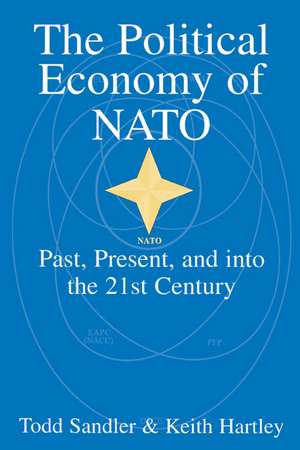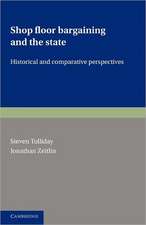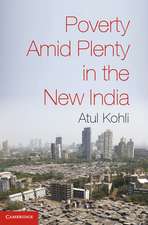The Political Economy of NATO: Past, Present and into the 21st Century
Autor Todd Sandler, Keith Hartleyen Limba Engleză Paperback – 12 apr 1999
| Toate formatele și edițiile | Preț | Express |
|---|---|---|
| Paperback (1) | 330.59 lei 6-8 săpt. | |
| Cambridge University Press – 12 apr 1999 | 330.59 lei 6-8 săpt. | |
| Hardback (1) | 449.31 lei 6-8 săpt. | |
| Cambridge University Press – 12 apr 1999 | 449.31 lei 6-8 săpt. |
Preț: 330.59 lei
Nou
Puncte Express: 496
Preț estimativ în valută:
63.27€ • 65.97$ • 52.58£
63.27€ • 65.97$ • 52.58£
Carte tipărită la comandă
Livrare economică 21 martie-04 aprilie
Preluare comenzi: 021 569.72.76
Specificații
ISBN-13: 9780521638807
ISBN-10: 0521638801
Pagini: 308
Ilustrații: 14 b/w illus. 39 tables
Dimensiuni: 152 x 229 x 18 mm
Greutate: 0.43 kg
Editura: Cambridge University Press
Colecția Cambridge University Press
Locul publicării:New York, United States
ISBN-10: 0521638801
Pagini: 308
Ilustrații: 14 b/w illus. 39 tables
Dimensiuni: 152 x 229 x 18 mm
Greutate: 0.43 kg
Editura: Cambridge University Press
Colecția Cambridge University Press
Locul publicării:New York, United States
Cuprins
1. NATO at the crossroads: an introduction; 2. NATO burden sharing and related issues; 3. On NATO expansion; 4. NATO and peacekeeping; 5. NATO and the defense industrial base: EU and USA; 6. NATO: challenges on the horizon; 7. NATO and Europe; 8. NATO design; 9. NATO: conclusions and future scenarios.
Recenzii
"Sandler and Hartley have nicely filled a big gap in the market for a book on defense economics without algebra. Its judicious mix of history, institutions and analysis and its broad coverage (from organizational design to environmental security) will guarantee it a place on reading lists in political science, international relations and economics courses. The Political Economy of NATO will become the standard reference for anyone wishing to understand the challenges the organization faces in its second half-century." Ron P. Smith, Birkbeck College, University of London
"The next few years may be the most critical point in NATO's history since its creation. In this remarkably thorough and precise book, Sandler and Hartley do a superb job of assessing the history of NATO and its current challenges in the areas of strategy, organization and industrial production. Unlike more tendentious works on NATO, Sandler and Hartley bring a true social science perspective to bear upon the issues. Introducing simple yet powerful models of interstate cooperation, the authors guide the reader through the classic debates on burden sharing within NATO, and into the current issues that will define the essence of NATO for decades to come, including some (such as terrorism and the environment) that have hitherto been peripheral to NATO's primary mission. The book is essential reading for anyone interested in an uncommonly cogent, careful and insightful assessment of the critical choices facing NATO." John Conybeare, University of Iowa
"Sandler and Hartley have done it again. This new book on NATO is a timely, analytical look at the problems and opportunities currently facing NATO in the context of a rapidly changing European context. This is not another 'NATO is Dead' tome, but rather an insightful look at how the organization is undergoing transformation in its membership, mission, and management of threats. This is the new book to read on NATO." Michael Ward, University of Washington, Seattle
"As we approach the millennium, NATO faces unprecedented demands, ranging from the challenges it recognizes, the tasks it accepts, the financing it requires, the membership it embraces, the structure of its organization, and even its continued operation. This book, by two of the world's premier analysts in the field, is unique for its sweeping grasp of the essentials of NATO's diverse and pressing questions. The Sandler-Hartley overview of these issues - useful to academic, policy, and operational circles - will endure well into the millennium which it foreshadows." Martin McGuire, University of California, Irvine
"Sandler and Hartley have provided a helpful introduction to the main policy issues confronting NATO's leadership. While demonstrating how tools of economic analysis can be applied to military issues, they also take due account of strategic and political considerations. They succeed in presenting a sophisticated analysis so as to be largely comprehensible to the non-technical reader, and in discussing issues from a neutral, trans-Atlantic perspective..." Anthony Lanyi, Public Choice
"The next few years may be the most critical point in NATO's history since its creation. In this remarkably thorough and precise book, Sandler and Hartley do a superb job of assessing the history of NATO and its current challenges in the areas of strategy, organization and industrial production. Unlike more tendentious works on NATO, Sandler and Hartley bring a true social science perspective to bear upon the issues. Introducing simple yet powerful models of interstate cooperation, the authors guide the reader through the classic debates on burden sharing within NATO, and into the current issues that will define the essence of NATO for decades to come, including some (such as terrorism and the environment) that have hitherto been peripheral to NATO's primary mission. The book is essential reading for anyone interested in an uncommonly cogent, careful and insightful assessment of the critical choices facing NATO." John Conybeare, University of Iowa
"Sandler and Hartley have done it again. This new book on NATO is a timely, analytical look at the problems and opportunities currently facing NATO in the context of a rapidly changing European context. This is not another 'NATO is Dead' tome, but rather an insightful look at how the organization is undergoing transformation in its membership, mission, and management of threats. This is the new book to read on NATO." Michael Ward, University of Washington, Seattle
"As we approach the millennium, NATO faces unprecedented demands, ranging from the challenges it recognizes, the tasks it accepts, the financing it requires, the membership it embraces, the structure of its organization, and even its continued operation. This book, by two of the world's premier analysts in the field, is unique for its sweeping grasp of the essentials of NATO's diverse and pressing questions. The Sandler-Hartley overview of these issues - useful to academic, policy, and operational circles - will endure well into the millennium which it foreshadows." Martin McGuire, University of California, Irvine
"Sandler and Hartley have provided a helpful introduction to the main policy issues confronting NATO's leadership. While demonstrating how tools of economic analysis can be applied to military issues, they also take due account of strategic and political considerations. They succeed in presenting a sophisticated analysis so as to be largely comprehensible to the non-technical reader, and in discussing issues from a neutral, trans-Atlantic perspective..." Anthony Lanyi, Public Choice
Descriere
Using simple economic methods while accounting for political and institutional factors, this book presents a political economy viewpoint of NATO's current and future status.

















